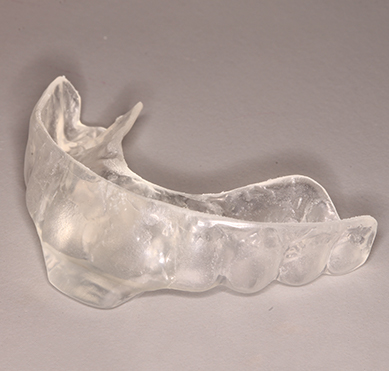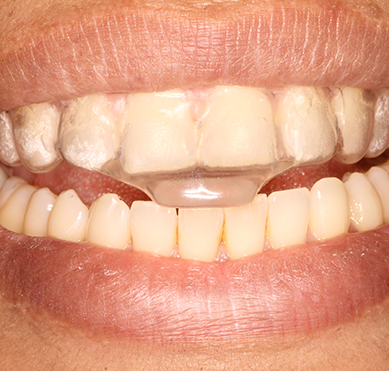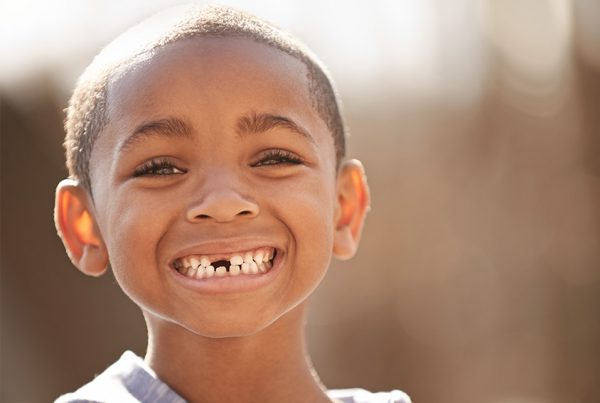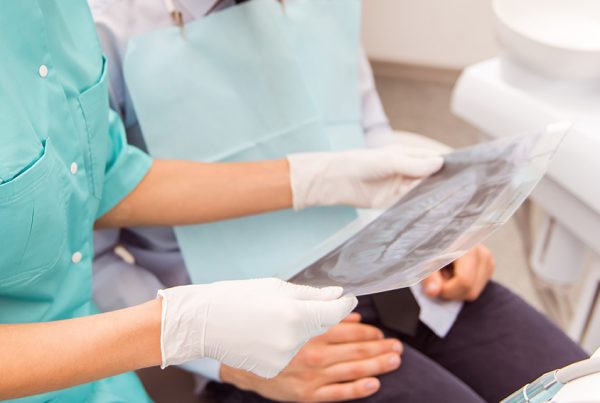You have two jaw joints; left and right. Your jaw joints are just in front of your ears on each side. This is where your lower jaw joins the rest of your head. It’s a joint that gets a lot of work because you can’t avoid using it. You need it when you eat and you need it when you talk.
Problems with your jaw joint commonly happen when you develop a habit that makes extra work for your jaw. This can be chewing lots of gum, chewing your nails or maybe pens. Commonly, it is caused by grinding your teeth or clenching. This can be going on without you even realising. My grandmother has a habit of pushing her jaw forward when she is concentrating. This lead to problems last year where she had pain in her teeth on the top right that her dentist couldn’t find a reason for. When you looked at her teeth, you could see that she had worn little grooves in them. These teeth fit together like a jigsaw when she pushed her jaw forward into the position she did when concentrating. The pain was because my grandmother was overloading these teeth and overstretching her jaw muscles.
So if you have jaw problems, it may be that during the day you are clenching or doing something with your jaw that you are not aware of. It may also be happening at night time. Grinding at night, when you are dreaming away about the stresses of the day is really common. If you are doing this, you may find that any jaw pain is worse when you wake up or when you are having your breakfast. You may find that you can’t open your jaw all the way when you first wake up. This is a clear sign that you are working your jaw while you sleep.
Symptoms
So what to look out for? A couple of the symptoms, I have already mentioned. If there is an issue with your jaw, you may get pain. This pain might come on while eating. It may be worse in the morning. It may feel like a toothache that is localised to a specific area or tooth. It may just feel like an ear ache or headache that you can’t really pin down to anywhere specific. It’s likely to be a dull ache that may feel worse with biting or chewing.
There may be a click or a pop that happens when you open your mouth. This is something that is very common. When your jaw joint pops, it is because a part of the joint has got stuck in the wrong position as you open. The pop is it popping back into place. A pop or click is not generally too much of an issue on it’s own. It’s very common and hard to treat. But if you get pain with the click, you should seek advice.
Grinding or clenching may lead to damage being caused to your teeth. This may be in the form of fractures and bits chipping away from your teeth. This may be in the form of wear; your teeth may start to flatten out or become shorter. These teeth can be restored as discussed in a separate article on worn teeth. It’s also important to consider preventing further wear. We will discuss this below.
Other symptoms of issues with your jaw include not being able to open all the way and discomfort when chewing hard foods.
Treatment
Problems with your jaw are basically repetitive strain injuries. So it’s like tennis elbow in your jaw. If you play a lot of tennis, the muscles and ligaments of your elbow get overworked. When they are overworked, they become inflamed and uncomfortable. If your jaw is overworked, the joint and muscles are inflamed and that’s what is causing the pain.
So the first thing to do is to try to cut out the extra work that your jaw is doing. Cut out any habits like chewing gum, chewing your fingers, toes and whatever else you can get in your mouth. Avoid harder foods and try to stick to a softer diet while things recover.
Painkillers will be helpful when you have the pain. Things like ibuprofen or paracetamol are best as long as you are okay taking them. Something like a ice pack (a bag of frozen peas wrapped in a tea towel) applied to the area over your jaw joint will help with the inflammation.
There are exercises that you can try to stretch out the muscles. In theory, this is almost like physiotherapy for your jaw joint. There is a bit of controversy about whether these exercises are actually helpful or not. Some people believe that they are really not helpful. I would advise you to ask your dentist what he or she recommends.
Night guards
If you are subconsciously grinding or clenching your teeth at night or while you are concentrating, it can be tricky to kick the habit. It’s going to be almost impossible without help from your dentist. Your dentist may advise that you try an appliance to wear at night. This can be called a guard or night guard. It can look like a sports guard that you would wear for hockey or rugby. They can sometimes be smaller and only cover a couple of teeth at the front. They should be worn whenever you believe that you are clenching or grinding. So it may be that you try to wear it overnight. If you know that you are clenching while working during the day, it may be necessary to wear it then. Obviously it won’t always be convenient to wear something in your mouth during the day so you’re just going to have to find what works for you. You won’t want to wear it while giving an important presentation to your boss.
If you are wearing a guard at night, be aware that it will take a few nights to get used to wearing it. For the first week, you will probably wake up in the morning and find that you have flung the offending article across the room in your sleep as your unconscious self got sick of it. This is very common to begin with. Persist with it. It gets easier with time. I have worn a guard at night for about 12 years to stop me grinding and now I find it hard to sleep if I don’t have it.
A standard night guard that covers all of your teeth can be soft or hard or a bit of both. This type of guard is very useful for putting a barrier between your teeth so that you can’t cause any damage to the teeth. The downside with these is that they will sometimes make you even better at grinding so you still get the jaw pain. For some people, a soft layer between their teeth makes them grind like crazy and so you are still overworking those strained jaw muscles.
An alternative is a guard that props you open slightly on your front teeth. These can come in different shapes and sizes. They can cover lots of teeth or just a couple. But the principle is the same. The guard can be worn on your top or bottom teeth and there is a bump at the front that only lets your front teeth touch. Your back teeth are kept apart. The idea is that if your back teeth are kept apart, you can’t use them to grind. This means that the muscles aren’t being overworked and instead are given time to relax. In the morning, you wake up and your chewing muscles are ready and raring to go because they’ve had the night off. Tension has been relieved and the inflammation can reduce. Now you’re ready to chat and chew all day.
Night guard

Night guard in mouth

Of course, it’s not going to get completely better straight away. You will need to give it time and get used to the guard. But if you can get a guard that keeps your back teeth apart, I would hope that any pain in your jaw should get better and better as the area around your jaw joint goes back to it’s healthy, happy self.
If you have tried all of these things and you are still having problems then you may need a more invasive treatment. Some surgical procedures are available. This can be necessary for patients who continually dislocate their jaws. Any surgery should always be a last resort and may not be for you.
If nothing has worked then you may just need to manage the symptoms by using some of the techniques mentioned above. Pain killers, soft diet and cutting out any habits like chewing gum are the easiest ways to reduce extra pressures on your jaw joint and keep any discomfort to a minimum.
Keep updated with the Online Dentist newslettersign up today
Recent Articles
 Tooth decay is when you get holes (also known as cavities) in your teeth. This is caused by bacteria in plaque. It’s one of the main reasons why you need...
Tooth decay is when you get holes (also known as cavities) in your teeth. This is caused by bacteria in plaque. It’s one of the main reasons why you need...
 NB: If you come to this section in a rush because someone has knocked an adult tooth completely out, go to ‘Knocked out adult tooth’ article. Of course young children...
NB: If you come to this section in a rush because someone has knocked an adult tooth completely out, go to ‘Knocked out adult tooth’ article. Of course young children...




